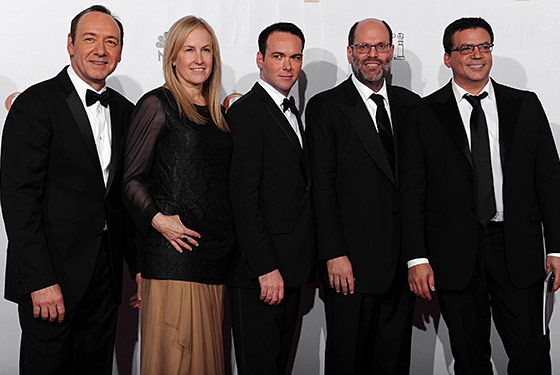
This weekend’s Oscars will end, as does every Oscar ceremony, with a small army of mostly anonymous middle-aged movie producers stepping up to the mike to thank people you don’t know and will never meet. In Hollywood, failure is always a bastard, but success has many fathers — maybe too many.
In the aftermath of 1998’s ugly Shakespeare in Love incident, when a surplus of stage-rushing producers nearly trampled a production assistant, the American Academy of Motion Picture Arts and Sciences ruled that no more than three producers could be included on the Best Picture ballot. But the rule of three has a loophole for “extraordinary circumstances,” and the producers of The Social Network — Dana Brunetti, Ceán Chaffin, Michael De Luca, and Scott Rudin — hope they will have cause to fully exploit that clause on Sunday.
Why do those producers deserve the chance to step up to the stage as a quartet, and not just a trio? And just what did they actually do, anyway? The answer lies in the complicated genesis of The Social Network, based on a book that hadn’t been written yet, and the result of two separate potential movies in the making that joined forces. Here, a guide for the perplexed:
Dana Brunetti: As president of Kevin Spacey’s production company, Trigger Street, Brunetti had first contact with its underlying source material, inasmuch as The Social Network can really be said to have been “based” on a book that was being written concurrently with its own screenplay. Based at MGM, Brunetti had the ailing studio option Ben Mezrich’s nonfiction book, Bringing Down the House: The Inside Story of Six M.I.T. Students Who Took Vegas for Millions, and turned it into the Spacey vehicle 21, which was distributed by Sony after it took a minority stake in the studio. In early 2008, Brunetti was advising Mezrich on his next book, The Accidental Billionaires: The Founding of Facebook, A Tale of Sex, Money, Genius, and Betrayal. In addition to having one colon too many in his book’s title, Mezrich was also having difficulty in connecting with the man who became his primary source, Facebook co-founder Eduardo Saverin. Brunetti agreed to invite Saverin to a March 2008 screening of 21 so that Mezrich could meet him and gather intel. Brunetti then arranged for Saverin to also attend the Las Vegas premiere of 21 later that month, so that Mezrich could get more material for his book — and, of course, so that Trigger Street would have something to turn into a film..
Michael De Luca: Having adapted Mezrich’s 21 with Brunetti and Spacey for the screen, De Luca was a natural choice to reteam with them to produce a Facebook movie. After Mezrich’s fourteen-page book proposal unexpectedly leaked on Gawker in May 2008, Brunetti and De Luca felt compelled to take their nascent project to a studio. MGM was choking on debt, and since De Luca was based at Sony along with Elizabeth Cantillion, the MGM executive who’d overseen 21, that’s exactly where The Social Network went.
Scott Rudin: Around the same time, New York–based producer Scott Rudin was also mulling his own a movie about Facebook and had already lined up screenwriter Aaron Sorkin to write it. Rudin had toyed with the idea of basing a film on Forbes journalist David Kirkpatrick’s book The Facebook Effect, but ultimately decided against it. So when Rudin approached Sony Pictures chairman Amy Pascal about doing a Facebook movie, she counseled that all parties should combine their efforts and eventually crafted a deal to make it happen. In the next year, Sorkin would generate two massive 160-plus page drafts for Rudin, De Luca, and Brunetti, delivering the first on May 28, 2009, and the next and final draft on July 2, 2009.
Ceán Chaffin: On July 22, 2009, The Social Network cemented David Fincher’s involvement. At a meeting held at Sony’s Culver City lot, Rudin, De Luca, and Brunetti joined Amy Pascal, production president Doug Belgrad, and studio executive VP Elizabeth Cantillon to meet with director David Fincher and Ceán Chaffin. While Brunetti had been in conversations with other directors, Fincher was Rudin’s top choice, and at this meeting, it was decided by all concerned that he was the right one. Chaffin, in addition to serving as Fincher’s longtime line producer on movies dating back to 1997’s The Game, is also his live-in girlfriend; it was a given that in hiring Fincher, the studio would also be hiring Chaffin as the primary day-to-day producer, critical duties she quickly assumed.
No word yet as to which producer will speak first (or last) if The Social Network goes all the way on Oscar night, but it’s certainly exciting to know that the politics of any acceptance speech will have the potential to foment a domestic dispute over at Le Maison de Fincher.

